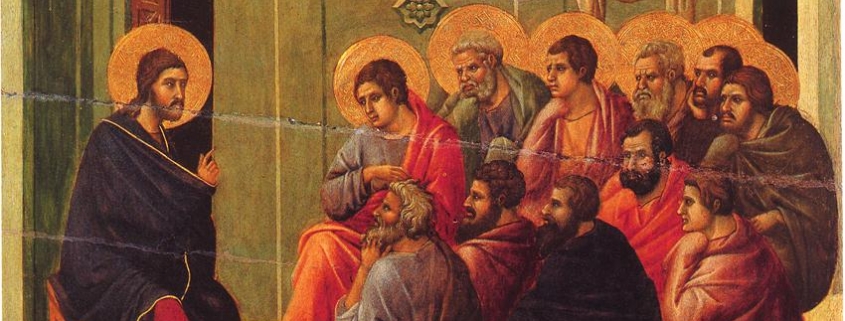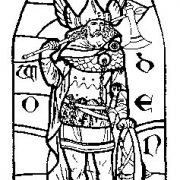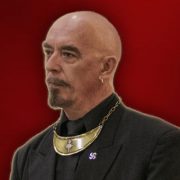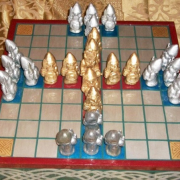The Christian Doctrine of the Incarnation – An Odinist view
OF ALL the doctrines of the Christian church it is the Incarnation which, the Christians themselves boast, distinguishes theirs most from other religions, both monotheistic and polytheistic. The Incarnation describes the Christians’ belief that a god came down from heaven to earth and became a man.
Now this belief may strike one at first as more pagan than monotheistic, for in other monotheistic religions such as Judaism and Islam, god is content to use the intermediaries of prophets rather than make a personal appearance in our world, whereas all the extant European mythologies do describe gods and goddesses appearing on earth in human form.
It is said of Odin, for instance, that he is often seen in his familiar guise by travellers at crossroads and tales of his leading his furious horde of night-raiders across the sky are well known. The Norse myths are full of references to gods, goddesses and Valkyries donning a human disguise to take a direct part in our affairs. This is a feature common to Greek and Roman mythologies, too. Likewise, legends of nature spirits appearing in flesh and blood, like the Lorelei maiden of the Rhine, have been preserved.
Since myths are intended to give an insight to spiritual truths and are not meant to be taken literally, the Odinist is free to interpret them as he likes. He may understand the description of these apparitions in a purely poetic sense as personalisations of natural forces. If he is more inclined to credit the reality of divine apparitions, the most probable explanation would be that an individual has made contact with the collective folk memory and has thus been able to make concrete and visible those forms which had lain unexpressed in his subconscious.
Nevertheless, all these ‘incarnations’ or apparitions, however they might be explained in modern Odinism, have nothing fundamentally in cannon with the Christian doctrine of the Incarnation. In Odinism the gods are donning a disguise. They neither cease to be gods nor adopt human mortal natures. Odin, the great shape-changer who travels through the worlds in many appearances, is described in the Eddas as taking on the shape of various animals, but there is no implication that he actually becomes an animal, for that would be absurd and incredible.
In Christianity a god actually becomes a man in the person of Christ whilst remaining a god. Christ is thus supposed to be two fundamentally different things at once, which is known in Christian thinking as a ‘mystery’, something which cannot humanly be understood but must nevertheless on pain of damnation be believed. Inevitably the complexities of such ideas, combined with the dogmatism typical of any form of monotheism, led to the most serious internal divisions. In fact, they nearly tore Christendom apart in the sixth, seventh and eighth centuries CE and well nigh brought the Byzantine Empire to its knees. I would give three reasons why heathen thinking has avoided this sort of pitfall implicit in the Christian concept of the Incarnation.
Firstly, the gap between man and god is much narrower than it is in Christianity. Since the gods are sufficiently like us there is little point in their undergoing an incomprehensible incarnation as god-made-man.
Secondly, Christians have justified their teaching of the Incarnation by arguing that the only being that can mediate between god and man to attain man’s salvation is one who combines both natures. In other words, the Incarnation has been integrated into the Christians’ mythology of salvation and damnation. Since we have no concept of a damning god, and since we are told to rely on our own resources rather than on somebody else’s merits, the need for mediation by a god-made-man is inapplicable to our faith.
The third and most important reason why the notion of incarnation, as defined by the church, is alien to heathen thinking, focuses on the differing attitudes to the concept of ‘god-in-nature’.
For us it is axiomatic that both men and gods are wholly within nature, as much so as the flowers and beasts, mountains and seas. All our gods are in sane measure nature gods. In fact, our cosmology extends beyond the world of our immediate perceptions to embrace many levels or worlds, traditionally nine in number, which all form part of a multiversal nature. Therefore, from our point of view, it can be said that Odin travels through the various worlds, but it would make no sense to suggest that he came down into the world to share in our nature and our fate. For he has always been part of our worlds and our nature. And his fate and ours are wholly wrapped up in each other.
Christians, however, do not recognise anything sacred or spiritual in natural forces and elements such as rain, sunshine, wind or thunder. Aspects of nature such as the fertility of living things and the rotation of the seasons have no bearing whatsoever on Christian theology. Indeed, the suggestion that the natural physical world is in itself sacred would strike a Christian as heathen, which of course it is.
Likewise, Christianity teaches that man’s physical life an earth is only a preliminary to his spiritual afterlife, not a goal in itself. There is also a tendency to view everything natural, physical and earthy as leading to temptation or sin.
The Christian god-outside-nature dwells outside the realms of time and space in eternity and infinity and not in the here and now, because he is distinct from his creation. Our Midgarth, they say, is merely relative and contingent and lacks any absolute reality, because god alone is absolute. There is a complete divorce between heaven and earth as the Christians use those terms. Christianity stands for ‘man-outside-nature, god-outside-nature’, in stark contrast to the ‘man-in-nature, gods-in-nature’ ethos of Odinism.
The Incarnation therefore implies that god spiritualises physical nature, the realm of time and space, by becoming part of it for a few short-lived decades in human history but that otherwise nature is spiritually dead. Heathenism, in contrast, expresses the idea that all of nature is living and alive and hallowed by the immanent presence of the gods and spirits. A doctrine such as the Incarnation, which is based on the false premise of the essential godlessness of Midgarth, must be rejected as tending towards the irreligious and irreverent.
Without a proper heathen understanding of the spirituality inherent in nature our world can never be spiritualised, never properly respected and appreciated for what it is and the divine will remain remotely relegated to the furthest reaches of unreality. So too for our godless and post Christian society to be respiritualised we must strive for a revival of the expressly heathen god-in-nature consciousness of Odinism.




